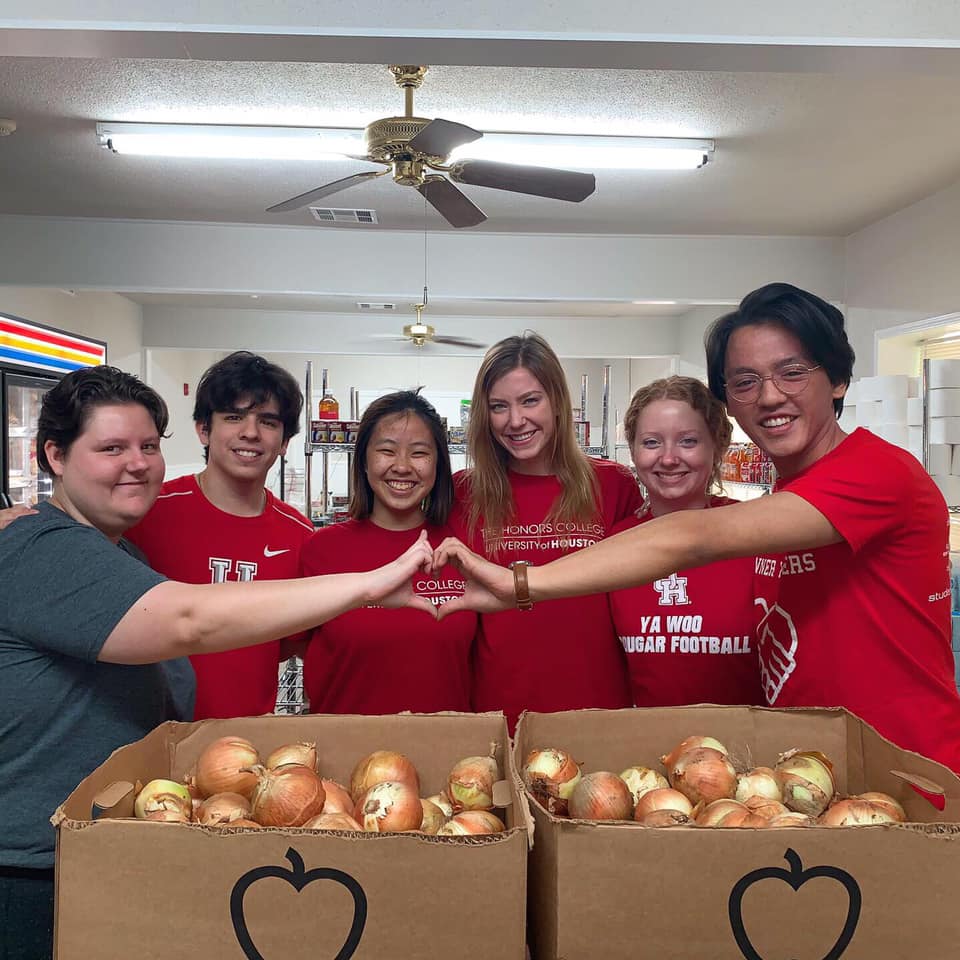Sara-Grace Chan
Sara-Grace Chan, B.S. in Biology, c/o 2021
Minors in Spanish, HR Management, and Medicine & Society
MPH in Healthcare Management Candidate at UTHealth
As one of the founding members of the Food Insecurity Team (FIT), Sara-Grace has gone on to execute similar projects while pursuing an MPH at UTHealth School of Public Health. Her previous work in Bonner gave her the skills needed to start a food pantry at her current institution. After earning her Master's degree, Sara-Grace plans on working in healthcare administration or in the government sector.
What was your favorite part of FIT?
I really enjoyed interacting with other members and the people that we were serving, at each location and especially at openings. It's hard to interact with other students when we are all different majors and classifications, but Bonner gives us moments to joke around and toss fruit at each other, and especially just getting to know each other during service was really important to me. Even outside of service, we had socials and outings, like sushi socials!
What is something valuable that you learned from Bonner?
One specific thing I learned from Bonner would be project and time management. It's super crazy to me that not everyone gets to learn about these skills that are so necessary to succeed in your future plans. We, as students, really have to go out on our own and make sure that we have enough time and energy to focus on school, Bonner, and extracurriculars, not even mentioning time for ourselves. Bonner teaches more corporate skills, without being corporate just yet.
How do you think Bonner supported your career goals?
I think Bonner has given me the ability to work with different stakeholders and learn how to organize certain areas of project management. My time in Bonner has been useful in helping me to be comfortable with talking to so many people and addressing certain issues that may arise in the workplace. I can also identify areas of improvement — all things that Bonner emphasizes — while still being culturally aware of how best to approach these things.
What is your proudest accomplishment in Bonner?
Probably starting FIT and then the Riverside Food Pantry. Those are things I worked really, really hard on, and I'm glad to see them still thriving and going with so much effort and drive.
Can you talk more about your accomplishment of a similar feat, the student food pantry, at UTHealth?
It started when I talked to my professors at UTHealth and stated how I didn't feel like any of the clubs or organizations already on campus focused on food insecurity specifically, and I asked if there were any initiatives that I could help with. They told me they needed someone to run a food pantry because a lot of students are international, and they can only work 20 hours a week on campus; plus the pay is so little. A lot of them need money for rent and food, and it's really not enough to live on. Some students were living in their cars or were homeless while going to school, so we wanted to create some efforts to alleviate some of the issues that students were facing. Since my professors knew that I already had some previous experience with Riverside, they let me join a team and help start the pantry at UTHealth. This pantry is different from the one I started in Bonner because we are more focused on sustainability and cultural sensitivity. Since there are so many international students, we have to make sure that they're comfortable with the foods that they're receiving. For example, we can't just offer pasta to any ethnicity, assuming that they cook it often. The process of starting the food pantries differed between Bonner and UTHealth because the UTHealth pantry wanted a sooner due date than the one at Riverside, especially because we weren't supported by Houston Food Bank at first. So, before we opened, we had to make sure that we had all of the necessary donations and food sources.
What does your life look like now?
Since I'm in my second year of graduate school, I'm focusing more on work and research than actual school.
I started my research last year around this time, and we are working on a paper about it now. One of my professors of epidemiology recommended I do research with her, her team and the Health Equity Collective. We work with a bunch of organizations that are trying to lower food insecurity in Houston by 5% by 2025. It's qualitative research, so we interview different people from these organizations, sort it into groups based on if they are actively doing food insecurity work, planning on it, or not planning on it. From these interviews, we can find themes among organizations, like the Houston Food Bank and American Heart Association. We have some initial findings, but I don't think I'm allowed to share them just yet.
I'm also a data analytics intern for a government consulting company, so I work with the HHSC (Texas Health and Human Services Commission) and specifically help clients with Medicaid enrollment and stuff like that. I really just work in the back and help with internal processes to help people with insurance. One specific thing I worked on this past summer was an analysis on whether we should hire Vietnamese customer service representatives versus using the language line for translations. I had to measure the pros and cons of each side, and I'm continuing the job this fall to actually hire the first Vietnamese customer service representatives to improve DEI (Diversity, Equity and Inclusion) and help people in the community.
What is your advice for current Bonners?
Go into Bonner with an open mind — it's a flexible environment that changes a lot. You have so much freedom to help the community in any way you want, with an unlimited amount of support. Make the most of it!
